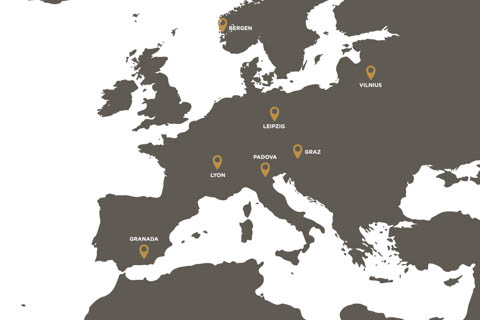English Studies (Literature, Linguistics, Culture)
| Faculty Faculty of Philology |
|
|
|
Scope of studies and length 120 ECTS credits, 2 years |
|
|
Qualification awarded Master in Humanities |
|
|
Application deadline* 1 May / 1 July |
|
|
Language English |
|
|
Tuition fee per year EU/EFTA students can apply for a state-funded places |
|
|
Start of studies
1 September
|
| City Vilnius |
The English Studies programme provides an excellent opportunity for students to acquire a specialist qualification in English Literature, Cultural studies and Linguistics. It is a broadly interdisciplinary programme concerned with both the theoretical and empirical analysis of the role of the English language, culture and literature in modern society. The programme consists of three equally balanced blocks of general and subject-specific courses in linguistics, literature and culture.
The programme is designed to not only develop the students’ subject-specific competencies, but also to provide them with the skills necessary to specialise in other fields.
Studies are closely related to the individualisation and differentiation of the study process, with the development of social skills, principles of study content integration, and the application of relevant modern methods of teaching and learning.
Why Study at Vilnius University?
|
What comes after?
|
|
When I reflect on my time at Vilnius University, I can confidently say that it has helped me become a better teacher in many ways. Through the linguistics seminars, I was challenged to explore areas I had not considered in detail before, and the literature and culture seminars provided me with new perspectives, enabling me to take a closer and more critical look at literary texts and cultural phenomena. In my role as a teacher, I have been able to revise my teaching practice using these new values and develop a greater sense of confidence. In particular, I have been able to create more critical assessments and formulate new discussion topics for my students, providing them with fresh and interesting ideas to engage with. I believe that these are the ripples of studying at Vilnius University, and I am grateful for the knowledge and skills that I gained during my time there.
|
|
"I joined the MA in English Studies at VU with the general goal of deepening my knowledge in literature and English, and the specific goal of becoming a better writer. In practical terms, the program gave me what I needed to hone skills complimentary to automation and technology in general, not substitute to it (we can't compete with machines). Thanks to this, I have shaped my path into an area of increasing relevance and opportunity – marketing and communications. Creativity can't be replaced, and as a comprehensive study on how creativity works, this MA helped me adapt my skill set to the job market, and much more." Santiago Jurkšaitis, Content editor at Panalpina, Prague, Czech Republic |


